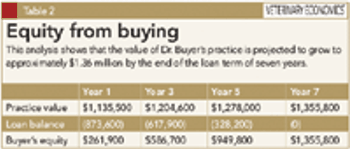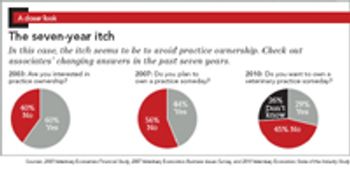
If a three-day weekend or short vacation isn't easing the stress of practice life, you may need more. Here's how one veterinarian found professional renewal through a two-month sabbatical.

If a three-day weekend or short vacation isn't easing the stress of practice life, you may need more. Here's how one veterinarian found professional renewal through a two-month sabbatical.

Every 10 seconds an animal is abused or beaten. That's according to the American Society for the Prevention of Cruelty to Animals (ASPCA). Here are five ways you can fight animal cruelty in your veterinary practice, according to the ASPCA.

Is conflict leaving you hot under the collar when you need to be cool as a cucumber? Put those feelings on ice to extinguish the flames.

Don't blow off conferences. Your brain and your career will thank you

The following is a letter sent in by a veterinarian. Let us know if you can relate-or think the receptionist deserves a break.

A new study says that working at home could be bad for your health.

This is an answer in "BizQuiz: Should you share this gossip?"

Gossip can strengthen relationships at your veterinary practice ... or tear them apart. Do you know when to talk and when to stay silent?

Therapist Jill Cody shares top tips for stressed veterinarians and team members to loosen up, handle criticism with flair, and start focusing on what you value most.


Caffeine and sugar may get you through your day at the veterinary practice, but they won't get you to your happy place. Exercise your mind by exercising your body and your rights to healthy food.

You can't give all of yourself away at the veterinary practice or you'll wind up with nothing left. Learn helpful coping skills to stay happy and healthy at the animal hospital.

Conflict happens, says marketing expert Karyn Gavzer to a packed room of veterinarians at the Western Veterinary Conference.

Are you living your passion? It's a question that motivational speaker Gary Zelesky asked more than 350 veterinarians and team members today.

A simple tip for at-a-glance identification on patient charts.

Save time searching for the best veterinary blogs with this Firstline-approved collection.

A new salary survey from the American Veterinary Medical Association (AVMA) shows increases for most exclusive companion animal veterinarians, but salary decreases for equine and mixed-animal practitioners.

After being promoted to practice manager, I've struggled to act like a boss toward my fellow team members. How can I strike a balance between friendship and professionalism?

My well-meaning boss will frequently say to a team member who isn't performing up to par, "You should be more like (another employee)." I've seen the team member not only take offense to the boss's statement but also feel resentment toward the other employee for being the favorite. Does this management approach have any real positives?

It's never too early to prepare for veterinary practice loan application. Follow these tips and avoid roadblocks on your road to ownership.

Many veterinary associates these days wonder whether buying a practice is still a viable option in today's economy. After all, how can they take on additional debt when they're already saddled with their student loan burden? Read on for the answer.

No interaction with your staff is insignificant. Give your full effort every day to keep team members happy and working hard.

Practice ownership carries many responsibilies, but the rewards compensate for any hardship.

The graceful shape of a cat's face. The watchful eye of a dog. The smile of a grateful client. These are the faces of veterinary care. They keep us going and can help us succeed in practice, conquer our mountains, and be the best veterinarians we can be.

Here are four ways to strengthen your relationship with clients.

Conquer clients' fears at the veterinary practice with these communication tips.

Three Veterinary Economics Editorial Advisory Board members share their thoughts on why associates fear to buy and how practice owners can help change that.

Close your eyes take a breath, kneel down in the High Temple, our High Temple, the exam room, and remember the smell of sweet-and-sour puppy breath.

Associates are turning away from traditional practice ownership in greater numbers. Can the industry bring veterinary ownership back to life?

Everything you need-policies, sample scripts, advice-on how to establish a no-gossip policy at your veterinary practice.